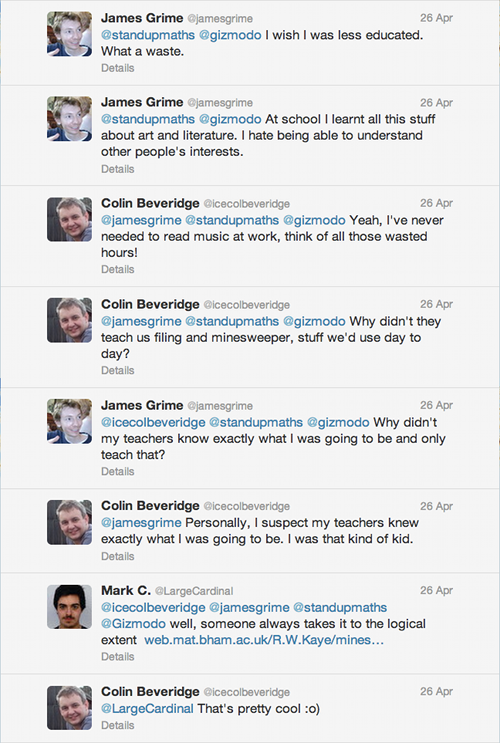You may have seen an article linked to last week, written by Jordan Weissmann at The Atlantic. The article was titled ‘Here’s How Little Math Americans Actually Use At Work‘, although mysteriously this journalist makes use of some mathematical analysis of survey data, and not only that, the data appears to show that 94% of Americans claim to use mathematics as part of their daily job.
The article discusses people’s misconceptions about the future utility of what they were learning, as well as the divide between using ‘any math’ and ‘advanced math’, which includes calculus, algebra and statistics. The number of Americans who admitted to using this type of maths appears to drop off once you get to anything more complicated than fractions, and also presented is an analysis of this divide by job type.
A very well-written and thoughtful response to this has already been posted at mathematics professor Bret Benesh’s blog, which gives four reasons why the article annoyed him (and probably several other people too).
If you enjoy getting outraged at people who are wrong on the internet, there was another article posted on Gizmodo the following day, entitled ‘Who Actually Uses Math At Work?‘, and using the same graph of data along with a scathing putdown of the entire subject of mathematics, including such gems as the opening statement,
Let’s admit it together. We all kind of suck at math. It’s okay! Numbers are evil.
The thrust of the Gizmodo piece is summed up by this quote:
But for someone who will never work with numbers in any sort of way passed addition and subtraction, why the hell are they taking advanced math classes every single year of high school?
Well, to start with, for someone who writes articles on the internet, maybe you should have skipped some maths classes and done more work on your spelling, but anyway, this argument was given short shrift by various people in the comments section. As James Grime pointed out on Twitter, the type of person who reads Gizmodo (a website of gadgets and technology news) is unlikely to sympathise with an anti-maths stance, and this level of maths-bashing is basically unnecessary.
A Twitter conversation between Matt Parker (@standupmaths) and several others went as follows:
Can anyone work out if I’ve been Poe’d? “Who Actually Uses Math at Work?” An attack on maths at gadget-site @gizmodo: gizmodo.com/5995408/who-ac…— Matt Parker (@standupmaths) April 26, 2013
Thus proving, at a stroke, both that sarcasm is the form of wit most likely to be deployed in the face of ridiculous statements, and that every conversation on the internet eventually reaches the point where someone posts a link to a webpage discussing NP-completeness and Turing-completeness of minesweeper.
Further reading:
Here’s How Little Math Americans Actually Use At Work, The Atlantic
Painters and Pure Mathematicians, Solvable By Radicals blog
Who Actually Uses Math at Work?, Gizmodo
